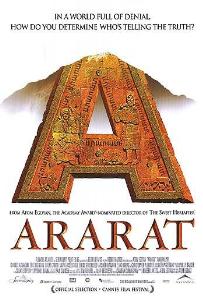Ararat (film)
| Ararat | |
|---|---|
 | |
| Directed by | Atom Egoyan |
| Written by | Atom Egoyan |
| Produced by | Atom Egoyan Robert Lantos |
| Starring | Charles Aznavour Christopher Plummer David Alpay Arsinée Khanjian Eric Bogosian Brent Carver Marie-Josée Croze |
| Distributed by | Miramax Films |
Release dates | May 20, 2002 (premiere at Cannes) September 20, 2002 (Armenia) 15 November, 2002 (USA) 18 April, 2003 (UK) April 13, 2006 (Turkey, TV premiere) |
Running time | 115 min. |
| Country | Canada/France |
| Languages | English Armenian French German |
Ararat is a 2002 film directed, written, and co-produced by Atom Egoyan about the Armenian Genocide, an event that is denied by the government of Turkey. In addition to exploring the human impact of the specific historical event, the film also examines the nature of truth and its representation through art. Ararat stars Charles Aznavour, Christopher Plummer, and David Alpay.
Background and structure
Egoyan is Armenian-Canadian and, as one of the few well-known Armenian filmmakers, had long been encouraged to make a film about the genocide. However, Egoyan's previous films had all demonstrated an interest in the impossibility of knowing absolute truth. Egoyan thus made Ararat deliberately self-referential. It depicts the efforts of an Armenian director, Edward Saroyan Charles Aznavour, to make a theatrical, Hollywood-style film about the genocide, from the fictionalised point of view of a genuine historical figure, Arshile Gorky.
Ararat thus includes graphic sequences depicting the horrors of the genocide, but they are always framed as scenes from Saroyan's film-within-the-film. Furthermore, the actors and filmmakers are shown discussing the ethical problems that arise when adaptating contentious subjects into simplistic movies; for example, Elias Koteas plays Ali, a Turkish-Canadian actor who becomes increasingly uncomfortable with playing the role of an evil Turkish military officer in Saroyan's film. (In a further complication, Koteas himself is Greek-Canadian, not Turkish). In addition, Saroyan's glossy costume-drama is contrasted with roughly-shot camcorder footage of lake Van and real ruined Armenian churches in the deserted city of Ani, near Mount Ararat.
There are also a number of secondary plots. One involves the relationship between Ani (played by Arsinee Khanjian), art historian expert on Gorky and adviser on Saroyan's fictional film, and her son Raffi (David Alpay). Another features Raffi and a Canadian customs official, David (Christopher Plummer), whose son is having a homosexual relationship with Ali, the actor in Saroyan's film.
Cast
- David Alpay as Raffi
- Charles Aznavour as Edward Saroyan
- Eric Bogosian as Rouben
- Christopher Plummer as David
- Marie-Josée Croze as Celia
- Arsinée Khanjian as Ani
- Brent Carver as Philip
- Bruce Greenwood as Martin Harcourt, actor playing Clarence Ussher
- Elias Koteas as Ali, actor playing Jevdet Bey
Reception
The film was given only a limited release in most countries, and failed to make a significant gross at the box office.[1]
Ararat won several awards. At the 2003 Genie Awards for best Canadian film, it was named best film of the year, and picked up awards for costume design and original score; in addition, Arsinée Khanjian won the best actress award and Elias Koteas best supporting actor. Egoyan won a prize from the Writers Guild of Canada awards, 2003. The film also won an award for best human rights film from the Political Film Society, and won the Golden Apricot at the Yerevan International Film Festival, 2004. An edited version of Ararat has been shown on the Turkish television station Kanal Turk.
Critical reception was mixed. Ararat received a 58 percent ("rotten") rating at Rotten Tomatoes[2] and a metascore of 48 ("Generally favorable reviews") at Metacritic.[3]
See also
References
- ^ Ararat at Box Office Mojo. Retrieved January 7, 2008.
- ^ Ararat at Rotten Tomatoes. Retrieved January 7, 2008.
- ^ Ararat at Metacritic. Retrieved January 7, 2008.
